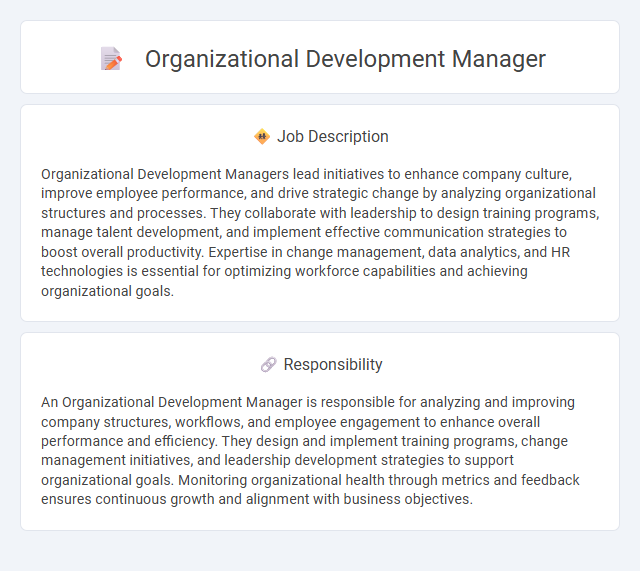
Organizational Development Managers lead initiatives to enhance company culture, improve employee performance, and drive strategic change by analyzing organizational structures and processes. They collaborate with leadership to design training programs, manage talent development, and implement effective communication strategies to boost overall productivity. Expertise in change management, data analytics, and HR technologies is essential for optimizing workforce capabilities and achieving organizational goals.
Individuals who thrive in dynamic, people-focused environments may find a career as an Organizational Development Manager suitable, as the role often requires strong interpersonal skills and the ability to manage change effectively. Candidates with a keen interest in improving workplace culture and enhancing employee engagement are likely to align well with the demands of this position. Those uncomfortable with ambiguity or frequent shifts in organizational priorities may find this role less fitting.
Qualification
An Organizational Development Manager typically holds a bachelor's degree in human resources, business administration, or a related field, with many employers preferring a master's degree or MBA. Key qualifications include strong skills in change management, talent development, and strategic planning, along with expertise in employee engagement and organizational assessment tools. Experience with data-driven decision-making, proficiency in project management, and excellent communication abilities are essential for successfully driving organizational improvement initiatives.
Responsibility
An Organizational Development Manager is responsible for analyzing and improving company structures, workflows, and employee engagement to enhance overall performance and efficiency. They design and implement training programs, change management initiatives, and leadership development strategies to support organizational goals. Monitoring organizational health through metrics and feedback ensures continuous growth and alignment with business objectives.
Benefit
Hiring an Organizational Development Manager may significantly enhance workforce productivity by identifying and implementing effective training programs. This role is likely to foster positive cultural shifts that improve employee engagement and retention. Companies could see increased adaptability to change, which may boost overall operational efficiency.
Challenge
An Organizational Development Manager might face the challenge of aligning diverse team dynamics with evolving company goals, which could require adapting strategies to rapidly changing business environments. There is a probability that resistance to change among employees may hinder the implementation of new processes, demanding strong leadership and communication skills. Overcoming these obstacles could be crucial for fostering a culture of continuous improvement and achieving long-term organizational success.
Career Advancement
Organizational Development Managers design and implement strategic initiatives that enhance workforce capabilities and improve overall business performance, positioning themselves as critical drivers of organizational success. Mastery in change management, leadership development, and employee engagement enables these professionals to secure advanced roles such as Director of Organizational Development or Chief Human Resources Officer. Continuous learning in data analytics and agile methodologies accelerates career growth and opens opportunities for leadership in global enterprises.
 kuljobs.com
kuljobs.com